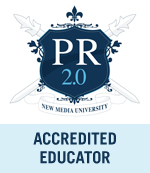“Community managers, who come in all shapes and sizes depending on the company and its mission, are often the online face of their companies, and more increasingly, offline as well. They’re the social strategist, community builder, storyteller, marketer, product manager, designer and evangelist rolled all into one. But most importantly, they’re responsible in projects and initiatives that strengthen the community of consumers, users and customers of the company.”
Maybe you’ve heard about this, where Chris Anderson foresees the death of the web. But in my opinion, it’s not that dramatic.
The massive growth of video must be seen as related to our cravings for televised events. The tv has in a sense movid into our computers, and now we see that our computers (i.e. the web) are moving into our television sets.
The decline of P2P isn’t that hard to explain either; streaming and better cloud services goes a long way in explaining the effects.
Add to this the fact that 5 mins of video equals thousands of brick thick novels when it comes to data size and the fact that the number of users increases.
So if we are going to pronounce the web dead to be, then we must first ask us what the web is. I for one, can’t really distinguish between video and web when it comes to a Youtube clip. The clip title, comments, navigational links, serp listisngs, it’s all very much tied together.
Doing stuff in an app might seem detached from the web today, but to say that apps are threathening the web is to say that offline applications are more powerful than online ones. For heavens’s sake (no pun intended), why can’t applications be both on- and offline?
Does this mean that I think that Chris Anderson’s article is rubbish as far as causality is concerned?
No. He makes a fair point:
“Over the past few years, one of the most important shifts in the digital world has been the move from the wide-open Web to semiclosed platforms that use the Internet for transport but not the browser for display.”
I believe this to be the driving force for the monetization of the web Jeremiah Owyang and Forrester predicted. Because even if the data isn’t made public, it sure as hell is accumulating somewhere.
“På Sveriges utbildningsföretag lär sig folk just nu om hur man kommunicerar digitalt, hur man maxar affärsnyttan i sociala medier och hur man bloggar effektivast för att nå ut. Även universiteten har hakat på tåget. Uppsala kör en sommarkurs om framväxten av bland annat Facebook, Youtube och Wikipedia och Umeå satsar på att lära ut tekniken bakom de sociala medierna.”
Jag håller med Joakim Jardenbergs resonemang rakt av här. Det finns väl ingen anledning att ställa det ena mot det andra? Det hade väl varit grymt coolt om denna “riktiga bokhandel” hade haft en “riktig bokhandel” på webben också?
Jag föreslog ett företag att lägga upp sina pressbilder på Flickr och på deras Facebook Page. Men de var inte så pigga på det eftersom de “ville ha kvar bilderna på sajten eftersom många letar efter dem där”. Vi måste få ett slut på antingen-eller-mentaliteten! Varför inte både och, liksom?
Stefan Hyttfors på ny adress! In i RSS-läsaren med den!
Något att hålla ögonen på! En sorts integererad storytelling?
Toppen när man tar sig tid att översätta bra engelska postningar till svenska! Like! Och tack för länken!Det verkar sjukt bra med en PR-byrå med kontor i Åre.

 Follow @DoktorSpinn on Twitter
Follow @DoktorSpinn on Twitter












